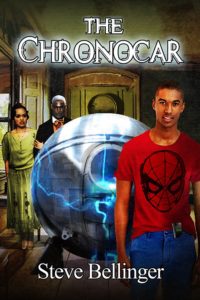A friend bought a copy of my first novel, a time travel story, with the sole intention of supporting me. He decided to read it to see what it was all about. He was surprised that he enjoyed it so much because, as he told me later, “I hate science fiction!” At least two other people have written reviews where they clearly expressed a dislike or ambivalence for science fiction, yet they admitted that they loved my story.
A young lady I know on Facebook was singing the praises of the latest installment of the Star Wars franchise and how much she enjoyed science fiction. In a comment, I corrected her. Star Wars may be great entertainment but it is not, I explained, science fiction.
“But, it has space ships and aliens!” she countered.
So here is my favorite definition: in science fiction, the science, whether real or imaginary, has to be so central to the narrative that without it the story would fall apart. Star Wars does not fit this criterion. You could give the characters metal swords, horses and sea going ships and tell essentially the same story; rebels fighting an evil empire. Even “the force” could be translated into Merlin-like magic. Star Wars is space opera, where space is merely the setting and the technologies are props. In fact the science and technology doesn’t even have to be logical. Just cool and exciting. Like light sabers.
Lest Star Wars fans take offense, this is not a put down. I’m a fan of Star Wars, especially the earlier films. In fact I found the first three in particular to be amazing and quite groundbreaking. It’s just that science fiction is not the proper category. Even George Lucas himself once described his epics as space opera. Google “George Lucas and space opera” to see for yourself.
Sci-Fi is yet another animal. Usually more science fiction than space opera, but not by much. You get Sci-Fi when you start with some science fiction and try to popularize it by punching it up and sometimes dumbing it down. For example, the finest science fiction film ever made, in my humble opinion is 2001: A Space Odyssey. It was almost brutally accurate, in ways that actually bored many moviegoers. The scenes in space often had music in the background; like the Blue Danube waltz playing while a shuttle docked with a space station. Not only for the beauty of it, but director Stanley Kubrick realized that there would be no sound in space, so you would not hear the engines. In the sequel, 2010, made 20 years later, when the engines lit, the theater rumbled with the sound. Fun and exciting, yes. Accurate, no.
In a now rather famous TV rant, science fiction author Harlan Ellison outlined what he felt was the difference between science fiction and Sci-Fi, on the Sci-Fi Channel of all places. Thoughts that I generally agree with. You can look this up on YouTube.
So, in a nutshell, Sci-Fi tends involve a lot of excitement and explosions; the stuff of epic movies. Science fiction is often more cerebral, although there can be intrigue, action and the occasional monster. Science fiction usually follows some sort of logic, the best involving the logic of real science. Sci-Fi, quite honestly, does not have to be logical. As long as it is exciting, scary, and mind boggling, it’s acceptable. Think sharks in a tornado.
Star Trek, at least in the beginning, kind of skirted between the two. Cerebral enough to worry the producers that no one would understand it, but it still had its share of explosions and evil aliens.
Since the first Isaac Asimov novel I read as a kid, I’ve loved science fiction. And, yes, I have enjoyed a lot of Sci-Fi, and space opera, also. But, as a writer, one of my goals is to help introduce readers to real, thought provoking science fiction. The sort of “old fashioned” science fiction that can be enjoyed by many readers.
Including those who don’t like Sci-Fi.
Steve Bellinger Bio:
 Steve Bellinger was born and raised on the West Side of Chicago by a single mom who worked nights for a printing company. She would bring home books and magazines to encourage him and his siblings to read. This is how he discovered Isaac Asimov, Robert Heinlein, Arthur C. Clarke and the other masters of classic science fiction. It didn’t take long for him to get the itch to write. Over the years he’s written everything from newspaper articles, comic strips and radio drama to short stories and fan fiction. He is the author of the award winning novel, The Chronocar, and the upcoming science fiction/paranormal thriller, Edge of Perception.
Steve Bellinger was born and raised on the West Side of Chicago by a single mom who worked nights for a printing company. She would bring home books and magazines to encourage him and his siblings to read. This is how he discovered Isaac Asimov, Robert Heinlein, Arthur C. Clarke and the other masters of classic science fiction. It didn’t take long for him to get the itch to write. Over the years he’s written everything from newspaper articles, comic strips and radio drama to short stories and fan fiction. He is the author of the award winning novel, The Chronocar, and the upcoming science fiction/paranormal thriller, Edge of Perception.
About The Chronocar
 Imagine being born the son of a slave with the mind of a genius. That was Simmie Johnson in the years following the Civil War. After a perilous escape from lynch mobs in Mississippi, he manages to earn a PhD in physics at Tuskegee, and in his research, discovers the secret of time travel. He develops a design for a time machine, called a Chronocar, but the technology required to make it work does not yet exist.
Imagine being born the son of a slave with the mind of a genius. That was Simmie Johnson in the years following the Civil War. After a perilous escape from lynch mobs in Mississippi, he manages to earn a PhD in physics at Tuskegee, and in his research, discovers the secret of time travel. He develops a design for a time machine, called a Chronocar, but the technology required to make it work does not yet exist.
Fast forward a hundred and twenty-five years. A young African American Illinois Tech student in Chicago finds Dr. Johnson’s plans and builds a Chronocar. He goes back to the year 1919 to meet the doctor and his beautiful daughter, Ollie, who live in Chicago’s Black Belt, now known as Bronzeville. But, he has chosen an unfortunate time in the past and becomes involved in the bloodiest race riot in Chicago’s history.


